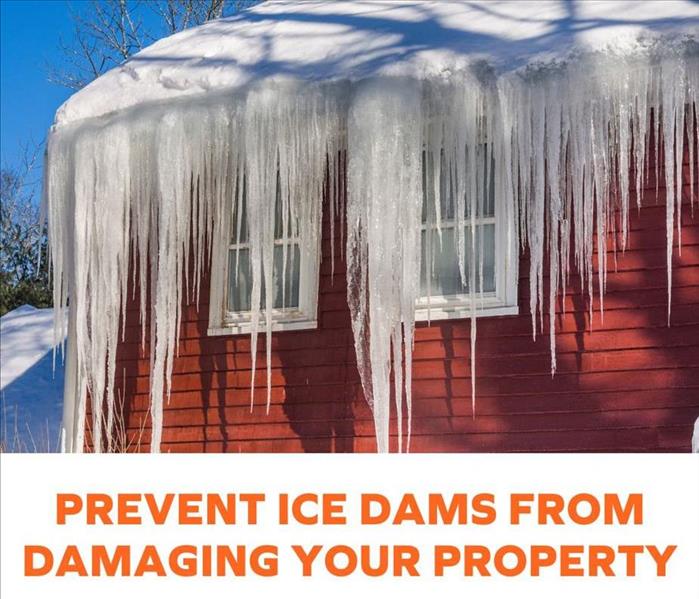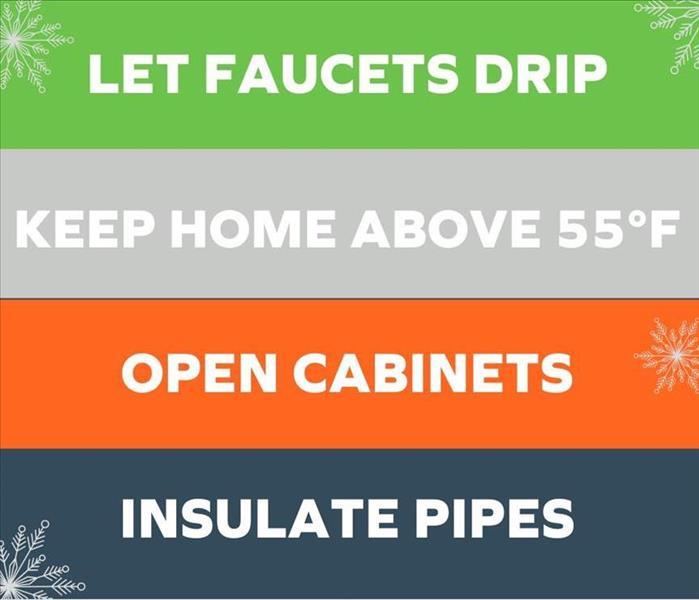Archived Water Damage Blog Posts
Understanding Ice Dams and How to Address Their Impact
1/23/2025 (Permalink)
As Central Pennsylvania grapples with sub-zero temperatures, homeowners face the heightened risk of ice dams. These pesky formations are not just a winter inconvenience; they can lead to significant property damage if left unchecked.
Here's everything you need to know about ice dams, their prevention, potential damage, and how SERVPRO Team Weaver can help.
What Are Ice Dams?
Ice dams form when snow on your roof melts, flows down, and refreezes near the eaves, where temperatures are colder. Over time, this ice buildup creates a barrier that prevents proper drainage, forcing water to seep under shingles and into your home.
How Do Ice Dams Form?
- Heat Escape: Warm air escapes from the attic, melting the snow on the roof.
- Cold Eaves: The melted snow freezes as it reaches the cooler edges of the roof.
- Blocked Drainage: This frozen barrier traps subsequent meltwater, which can then leak into your home.
Damage Ice Dams Can Cause
Ice dams can wreak havoc on your property, including:
- Water Damage: Leaks can penetrate walls, ceilings, and insulation, leading to water stains and mold growth.
- Structural Damage: Repeated freezing and thawing can compromise roofing materials and gutters.
- Decreased Energy Efficiency: Damaged insulation allows heat to escape, raising heating costs.
Preventing Ice Dams
Proactive measures are essential to prevent ice dams:
- Improve Insulation: Proper attic insulation minimizes heat escape.
- Ventilation: Ensure adequate attic ventilation to keep roof temperatures consistent.
- Snow Removal: Use a roof rake to remove snow buildup safely.
SERVPRO Team Weaver: Your Partner in Ice Dam Damage Restoration
If ice dams have already caused damage, SERVPRO Team Weaver is here to help. We specialize in restoring your home to preloss condition, offering:
- Water Damage Restoration: We address leaks and mitigate water damage with advanced equipment.
- Mold Remediation: Our team ensures your home is free from mold caused by trapped moisture.
- Emergency Services: With our “Faster to any size disaster” promise, we act quickly to minimize damage????.
Why Choose SERVPRO Team Weaver?
- 24/7 Availability: We’re always ready to respond to your emergencies.
- Skilled Professionals: Our highly trained team utilizes industry-leading techniques and technology.
- Comprehensive Solutions: From assessment to final restoration, we handle every step of the process.
- Commitment to Excellence: Our goal is to make it "Like it never even happened."
This winter, don’t let ice dams compromise your safety and comfort. Stay proactive with prevention, and trust SERVPRO Team Weaver to restore your home should damage occur.
Contact us today for expert guidance and prompt service.
Protect Your Home and Business Against Frozen Pipes This Winter
1/23/2025 (Permalink)
Cold weather can lead to significant damage from frozen pipes. Follow these tips to safeguard your home or business:
- Set thermostats to 55°F or higher to keep your pipes above freezing temperature.
- Drip cold water from the faucet farthest from the main water valve. Continuous water flow helps prevent freezing.
- Locate your main shut-off valve for emergencies and mark it for easy access.
- Insulate pipes in unheated areas like basements, crawl spaces, or garages.
- Open cabinets and vanities to allow warm air to circulate around exposed pipes.
- Drain and shut off outdoor spigots by closing interior valves, then leave the exterior spigot open. This helps any remaining water expand without causing pipe breaks.
- Prepare early for freezing temperatures by draining outdoor irrigation systems and sealing drafty areas around pipes.
Thawing Frozen Pipes
If you suspect your pipes have frozen, act quickly to prevent further damage:
- Confirm the issue: Ask a neighbor if they’re experiencing water loss; if not, your pipes are likely frozen.
- Turn off water at the main valve to avoid flooding when the ice thaws.
- Open faucets: Allow water to flow as ice melts, reducing pressure and speeding up thawing.
- Apply safe heat sources: Use a hair dryer or portable heater, but keep heat away from flammable materials. Avoid open flames, blow torches, or any method that could cause boiling or pipe damage.
- Inspect for leaks or cracks after thawing and turn the water back on slowly to check for damage.
In Case of Burst Pipes
- Turn off water immediately using your main shut-off valve.
- Call SERVPRO® to address water damage and ensure your property is restored "Like it never even happened®."
Round and round we go!
1/19/2023 (Permalink)
 Rising creek after fast, heavy rain.
Rising creek after fast, heavy rain.
Round after round of heavy rain on saturated soils could lead to considerable flood potential. Rising creeks and streams, mudslides, and clogged storm drains can lead to in home flooding.
If your home is known to take on water, here are a few things you can do to help keep your property and contents safe from water damage:
- Check with a professional to:
- Raise your furnace, water heater, and electric panel to floors that are less likely to be flooded. An undamaged water heater may be your best source of fresh water after a flood.
- Install check valves in plumbing to prevent floodwater from backing up into the drains of your home. (As a last resort, when floods threaten, use large corks or stoppers to plug showers, tubs, or basins.)
- Construct barriers with sand bags or other inexpensive barriers to stop floodwater from entering the building. These items can be found anywhere from your local hardware store to online companies such as U-Line and Amazon.
- Seal walls in basements with waterproofing compounds to avoid seepage through cracks.
If all else fails and your home or property does take on water, SERVPRO of Altoona can help to dry you out, save belongings, and prevent or treat mold.
Understanding Water Types
4/9/2020 (Permalink)
When your home or business suffers a water damage, understanding what type of water you are dealing with is critical to ensuring proper cleanup. There are three types of water. Clean water is water from a broken pipe, or other water source; rainwater is also considered clean. The term gray water is used to classify slightly contaminated water. Clean water becomes gray water when it's left untreated allowing bacteria and other contaminants to begin growing, making the water hazardous. Black water is highly contaminated and filled with fungi, bacteria, chemicals and more. Black water is typically caused by sewage damage, flooding or any type of natural disaster. Black water should always be handled by trained professionals. When you have a water damage, don't leave your property to chance. Call us and consider taking the following precautions to help minimize damage or prevent further damage while waiting for help to arrive.
Damage from Clean Water
- Shut off the water source if possible or contact a qualified professional to do so.
- Turn off circuit breakers for wet areas of the building if access to the power distribution panel is safe from potential electric shock. Do not enter rooms with standing water, as electrical shock hazards may exist.
- Remove as much excess water as possible by mopping and blotting. Wipe excess water from wood furniture after removing lamps and tabletop items.
- Remove and prop up wet upholstery cushions to allow more even drying.
- Move any paintings, art objects, computers, documents and other valuable items that may be sensitive to moisture to a safe place.
- Do not leave books, newspapers, magazines or other colored items on wet carpets or floors as they may cause staining.
- Do not use your household vacuum cleaner to remove water as there is potential for electrical shock or causing damage to the vacuum cleaner.
- Do not turn on ceiling fixtures if ceiling is wet; do not enter rooms where ceilings are sagging from retained water.
Damage from Contaminated Water
- Avoid all contact with sewage and items contaminated by sewage. Wash your hands thoroughly if you come in contact with contaminated items.
- Do not walk through contaminated areas, as you could spread damage to unaffected areas.
- Do not turn on the HVAC system if there is a possibility of spreading contaminated air.
- Do not use household fans to dry the structure; air flow could spread contaminants.
- Discard any food and/or products for personal hygiene and cleanliness if exposed to the contaminated areas.
Emergency Water Damage Tips
1/23/2020 (Permalink)
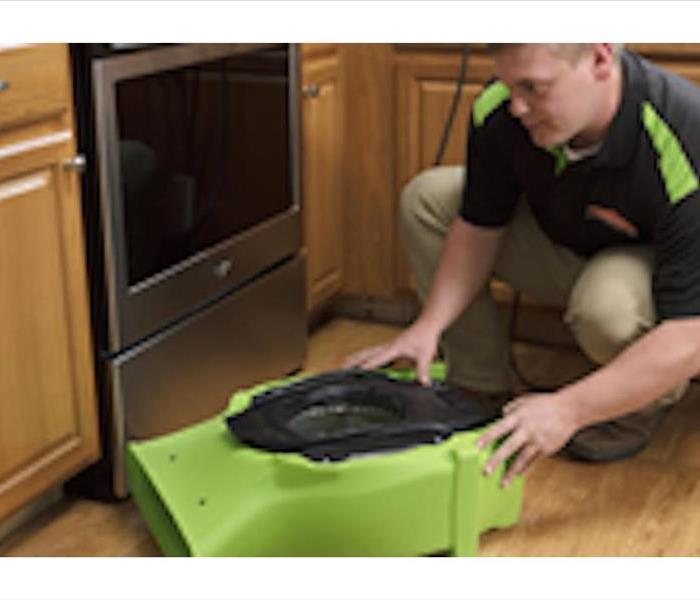 For more information on recovering from water damage, contact the SERVPRO of Altoona professionals.
For more information on recovering from water damage, contact the SERVPRO of Altoona professionals.
1. Shut off the water source, if possible, or contact a qualified professional to stop the water source.
2. Turn off circuit breakers for wet areas of the building when access to the power distribution panel is safe from electrical shock.
3. Remove as much excess water as possible by mopping and blotting.
4. Place aluminum foil or wood blocks between furniture legs and wet carpeting.
5. Move any paintings, art objects, computers, documents and other sensitive valuables to a dry place.
6. Do not enter affected areas if electrical outlets, switches, circuit breakers or electrical equipment are exposed to water. Always avoid electrical shock hazards.
7. Do not use your household vacuum cleaner to remove water! This could cause electrical shock or damage to the device.
8. Do not turn on ceiling fixtures if the ceiling is wet or enter rooms where ceilings are sagging from retained water.
When fire or water damage puts the things that matter most on the line, you need the very best help on the line as well. Call 814-946-0119 to get the team that's faster to any size disaster. We're a leader in giving control back to homeowners, property managers, and even entire communities, after the ravaging effects of water or fire.
What to Do Until Help Arrives (Water Damage)
1/14/2020 (Permalink)
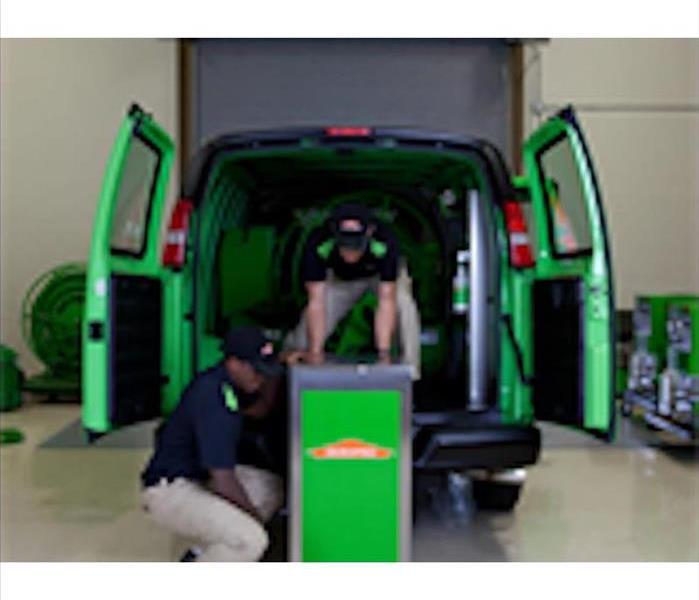 Help is on the way!
Help is on the way!
Water Damage From Clean Water
DO:
- Shut off the source of water if possible or contact a qualified party to stop the water source.
- Turn off circuit breakers for wet areas of the building, when access to the power distribution panel is safe from electrical shock.
- Remove as much excess water as possible by mopping and blotting.
- Wipe excess water from wood furniture after removing lamps and tabletop items.
- Remove and prop up wet upholstery cushions for even drying.
- Place aluminum foil or wood blocks between furniture legs and wet carpeting.
- Remove to a safe, dry place any paintings, art objects, computers, documents and other materials that are valuable or sensitive to moisture.
- Use wooden clothespins to keep furniture skirting off damp floors.
- Hang draperies with coated hangers to avoid contact with wet carpeting or floors.
- Hang furs and leather goods to dry separately at room temperature.
DON'T:
- Enter rooms with standing water where electrical shock hazards may exist.
- Enter affected areas if electrical outlets, switches, circuit breakers or electrical equipment are exposed to water. Always avoid electrical shock hazards.
- Leave books, newspapers, magazines or other colored items on wet carpets or floors to cause staining.
- Leave Oriental rugs or other colored rugs on wet wall-to-wall carpets to cause staining.
- Use your household vacuum cleaner.
- Use TVs or other appliances while standing on wet carpets or floors, especially not on wet concrete floors.
- Turn on ceiling fixtures if ceiling is wet or enter rooms where ceilings are sagging from retained water.
Water Damage From Contaminated Water
DO:
- Avoid all contact with sewage and items contaminated by sewage.
- Wash your hands thoroughly after contact with contaminated items.
DON'T:
- Spread contaminated water by walking unnecessarily on damaged or wet areas.
- Turn on the HVAC system if there is a possibility of spreading contaminated air.
- Use household fans to dry the structure and spread contaminants.
- Use products for personal hygiene and cleanliness if exposed to the contaminated areas.
Note: If exposed to harmful waste, OSHA recommends a post-exposure medial evaluation. Consult your local health department or physician.
Importance of Water Damage Cleanup
7/23/2019 (Permalink)
There's no such thing as a small disaster, especially when the water you don't see contains bacteria or can cause mold, rot, and other unseen damage. Water damage can affect the value of your property. Before you get out the mop bucket and try to clean it yourself, consider how the damage can affect your commercial property.
SERVPRO professionals know how disruptive water damage can be for your business. SERVPRO professionals are trained and equipped to manage the drying process from start to finish. By utilizing the proper equipment and moisture measuring devices, your commercial building will be quickly and thoroughly dried to industry standards, which will help prevent secondary damages! With rapid response time and a full line of water cleanup and restoration services, SERVPRO professionals can help you regain control quickly, by helping to ensure your facility and its contents are properly dried, deodorized and protected.
Before you risk further damaging the value of your commercial facility by attempting to clean the mess yourself, call your local water damage cleanup and restoration professionals at SERVPRO.
Water Restoration
7/2/2019 (Permalink)
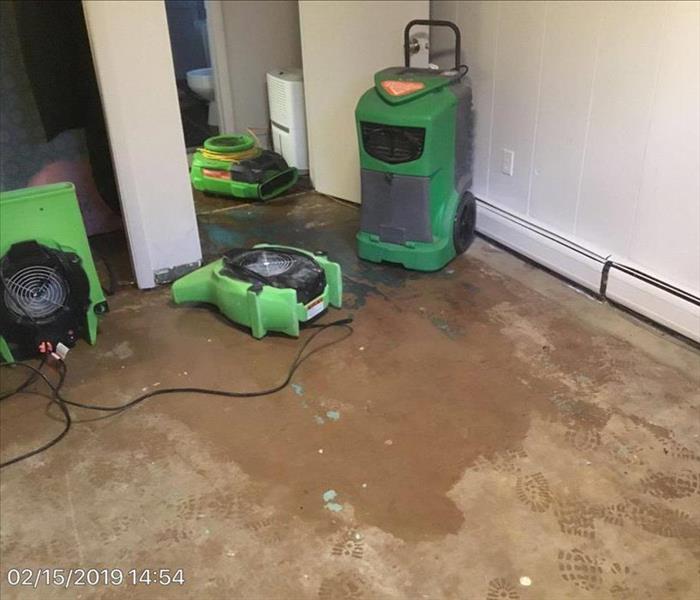 Our team drying and restoring a water-damaged bedroom.
Our team drying and restoring a water-damaged bedroom.
As a leader in the cleaning and restoration industry, SERVPRO strives to meet or exceed the expectations of every customer, client, or potential stakeholder that is involved with water damaged property. Every property, every project and every customer deserves excellence. Water intrusion in a home or business is a traumatic event. Effectively restoring a water-damaged building, and its contents, is a valuable service to the homeowner or business owner, as well as to the insurance industry. In residential homes, the normal lifestyle of residents is severely disrupted. This type of disruption creates stress and uncertainty for many individuals. In commercial properties, business interruption can be devastating and costly. A professional water restorer can provide guidance and assistance to help business owners make the best decisions through these difficult times. Excessive water and moisture in the indoor environment may pose a health risk for occupants, and if not resolved properly, water intrusions cause severe damages to structures and contents. These are many of the factors that drive our SERVPRO professionals to make it “Like it never even happened.”

 24/7 Emergency Service
24/7 Emergency Service
